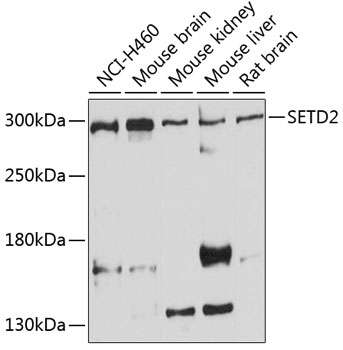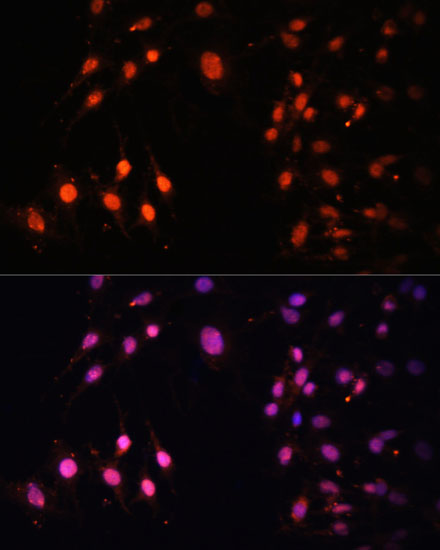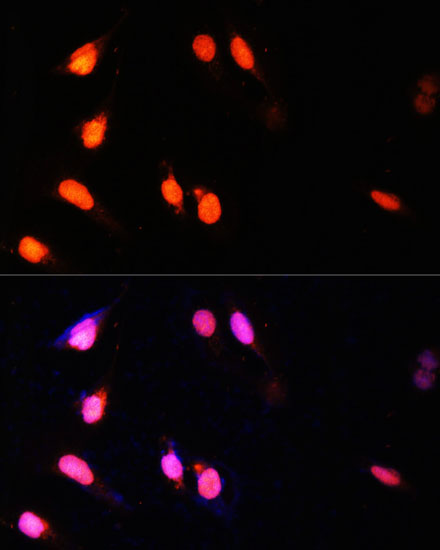Anti-SETD2 Antibody (CAB3194)
- SKU:
- CAB3194
- Product type:
- Antibody
- Reactivity:
- Human
- Mouse
- Rat
- Host Species:
- Rabbit
- Isotype:
- IgG
- Research Area:
- Immunology
Frequently bought together:
Description
| Antibody Name: | Anti-SETD2 Antibody |
| Antibody SKU: | CAB3194 |
| Antibody Size: | 20uL, 50uL, 100uL |
| Application: | WB IF |
| Reactivity: | Human, Mouse, Rat |
| Host Species: | Rabbit |
| Immunogen: | Recombinant fusion protein containing a sequence corresponding to amino acids 803-1103 of human SETD2 (NP_054878.5). |
| Application: | WB IF |
| Recommended Dilution: | WB 1:500 - 1:2000 IF 1:50 - 1:200 |
| Reactivity: | Human, Mouse, Rat |
| Positive Samples: | NCI-H460, Mouse brain, Mouse kidney, Mouse liver, Rat brain |
| Immunogen: | Recombinant fusion protein containing a sequence corresponding to amino acids 803-1103 of human SETD2 (NP_054878.5). |
| Purification Method: | Affinity purification |
| Storage Buffer: | Store at -20°C. Avoid freeze / thaw cycles. Buffer: PBS with 0.02% sodium azide, 50% glycerol, pH7.3. |
| Isotype: | IgG |
| Sequence: | SLCN SEAE NIEP SVMK ISSN SFMN VHLE SKPV ICDS RNLT DHSK FACE EYKQ SIGS TSSA SVNH FDDL YQPI GSSG IASS LQSL PPGI KVDS LTLL KCGE NTSP VLDA VLKS KKSS EFLK HAGK ETIV EVGS DLPD SGKG FASR ENRR NNGL SGKC LQEA QEEG NSIL PERR GRPE ISLD ERGE GGHV HTSD DSEV VFSS CDLN LTME DSDG VTYA LKCD SSGH APEI VSTV HEDY SGSS ESSN DESD SEDT DSDD SSIP RNRL QSVV VVPK NSTL PMEE TSPC SSRS SQSY RHYS DHWE D |
| Gene ID: | 29072 |
| Uniprot: | Q9BYW2 |
| Cellular Location: | Chromosome, Nucleus |
| Calculated MW: | 175kDa/192kDa/287kDa |
| Observed MW: | 300kDa |
| Synonyms: | SETD2, HBP231, HIF-1, HIP-1, HSPC069, HYPB, KMT3A, LLS, SET2, p231HBP |
| Background: | Huntington's disease (HD), a neurodegenerative disorder characterized by loss of striatal neurons, is caused by an expansion of a polyglutamine tract in the HD protein huntingtin. This gene encodes a protein belonging to a class of huntingtin interacting proteins characterized by WW motifs. This protein is a histone methyltransferase that is specific for lysine-36 of histone H3, and methylation of this residue is associated with active chromatin. This protein also contains a novel transcriptional activation domain and has been found associated with hyperphosphorylated RNA polymerase II. |
| UniProt Protein Function: | SETD2: Histone methyltransferase that methylates 'Lys-36' of histone H3. H3 'Lys-36' methylation represents a specific tag for epigenetic transcriptional activation. Probably plays a role in chromatin structure modulation during elongation via its interaction with hyperphosphorylated POLR2A. Binds DNA at promoters. May also act as a transcription activator that binds to promoters. Binds to the promoters of adenovirus 12 E1A gene in case of infection, possibly leading to regulate its expression. Belongs to the histone-lysine methyltransferase family. SET2 subfamily. 3 isoforms of the human protein are produced by alternative splicing. |
| UniProt Protein Details: | Protein type:Amino Acid Metabolism - lysine degradation; Methyltransferase, protein lysine; EC 2.1.1.43; Methyltransferase Chromosomal Location of Human Ortholog: 3p21.31 Cellular Component: nucleoplasm; chromosome Molecular Function:protein binding; histone-lysine N-methyltransferase activity Biological Process: pericardium development; establishment and/or maintenance of chromatin architecture; stem cell development; mismatch repair; regulation of transcription, DNA-dependent; mesoderm morphogenesis; forebrain development; neural tube closure; RNA elongation from RNA polymerase II promoter; embryonic cranial skeleton morphogenesis; morphogenesis of a branching structure; angiogenesis |
| NCBI Summary: | Huntington's disease (HD), a neurodegenerative disorder characterized by loss of striatal neurons, is caused by an expansion of a polyglutamine tract in the HD protein huntingtin. This gene encodes a protein belonging to a class of huntingtin interacting proteins characterized by WW motifs. This protein is a histone methyltransferase that is specific for lysine-36 of histone H3, and methylation of this residue is associated with active chromatin. This protein also contains a novel transcriptional activation domain and has been found associated with hyperphosphorylated RNA polymerase II. [provided by RefSeq, Aug 2008] |
| UniProt Code: | Q9BYW2 |
| NCBI GenInfo Identifier: | 296452963 |
| NCBI Gene ID: | 29072 |
| NCBI Accession: | Q9BYW2.3 |
| UniProt Secondary Accession: | Q9BYW2,O75397, O75405, Q17RW8, Q5BKS9, Q5QGN2, Q69YI5 Q6IN64, Q6ZN53, Q6ZS25, Q8N3R0, Q8TCN0, |
| UniProt Related Accession: | Q9BYW2 |
| Molecular Weight: | 2564 |
| NCBI Full Name: | Histone-lysine N-methyltransferase SETD2 |
| NCBI Synonym Full Names: | SET domain containing 2 |
| NCBI Official Symbol: | SETD2 |
| NCBI Official Synonym Symbols: | HYPB; SET2; HIF-1; HIP-1; KMT3A; HBP231; HSPC069; p231HBP |
| NCBI Protein Information: | histone-lysine N-methyltransferase SETD2; huntingtin yeast partner B; lysine N-methyltransferase 3A; huntingtin interacting protein 1; huntingtin-interacting protein B |
| UniProt Protein Name: | Histone-lysine N-methyltransferase SETD2 |
| UniProt Synonym Protein Names: | HIF-1; Huntingtin yeast partner B; Huntingtin-interacting protein 1; HIP-1; Huntingtin-interacting protein B; Lysine N-methyltransferase 3A; SET domain-containing protein 2; hSET2; p231HBP |
| Protein Family: | Histone-lysine N-methyltransferase |
| UniProt Gene Name: | SETD2 |
| UniProt Entry Name: | SETD2_HUMAN |









